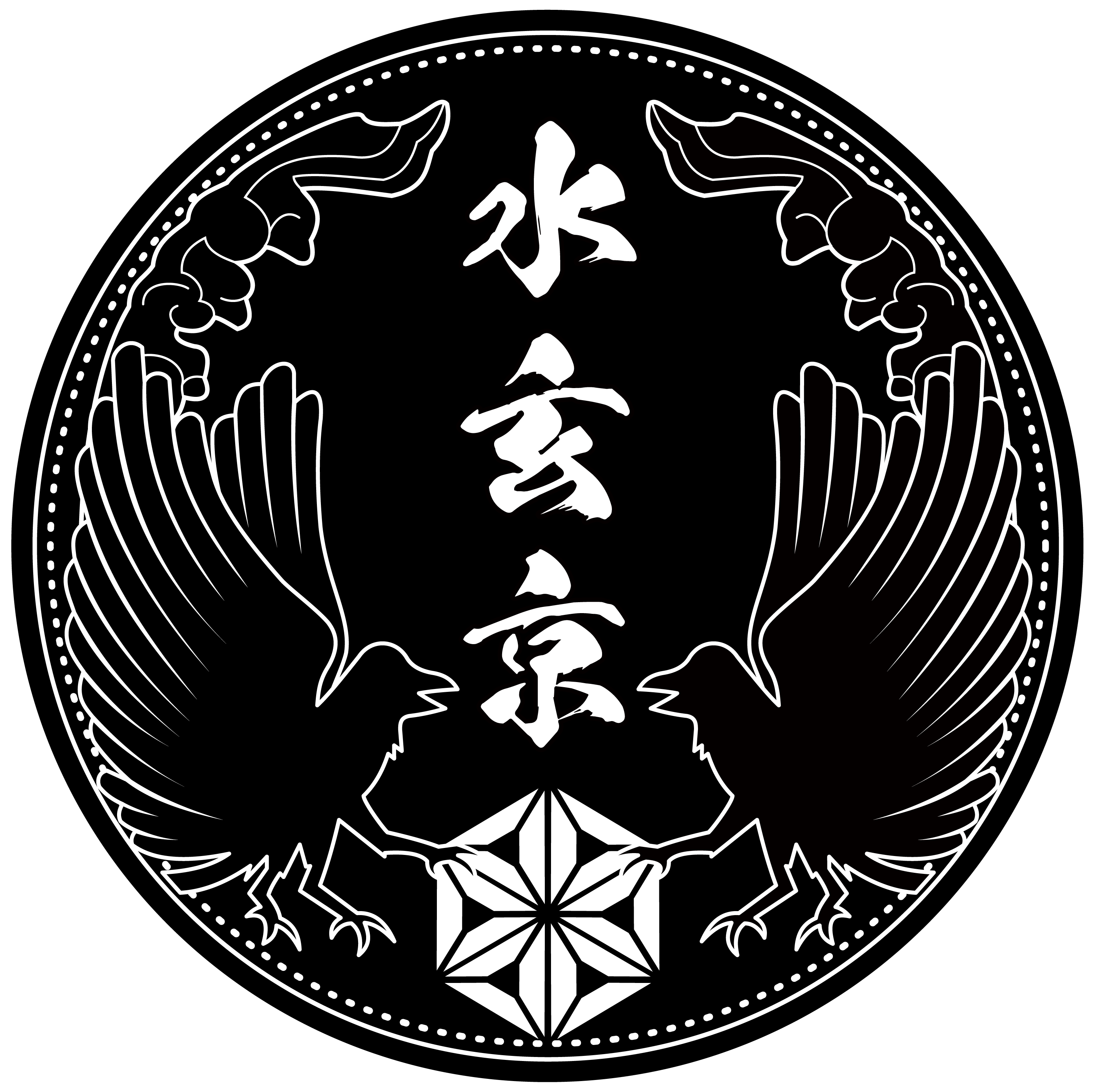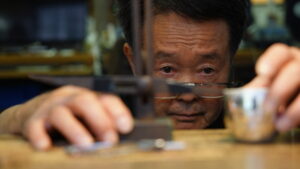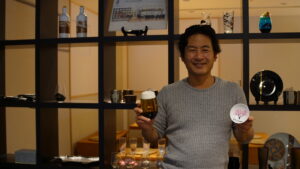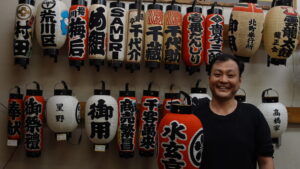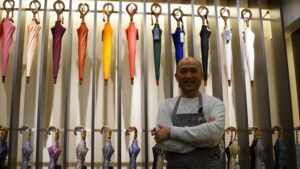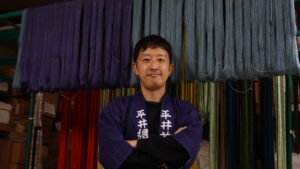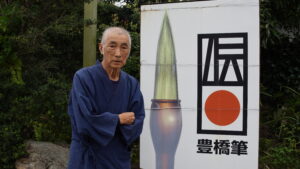The Importance of Continuation
From the age of three, he has listened to the sound of hammering silver done by his grandfather, his master’s father, and his father. Mr. Yoshitsugu Kamikawa, a silversmith, shared his childhood memories with us. His family has been making a traditional craft since the Edo period and has passed down their skills for 12 generations. Mr. Kamikawa, who has participated in numerous media and events to preserve this technique for the next generation, has a high perspective and a soft-spoken manner. We interviewed Mr. Kamikawa about his background and plans for future.
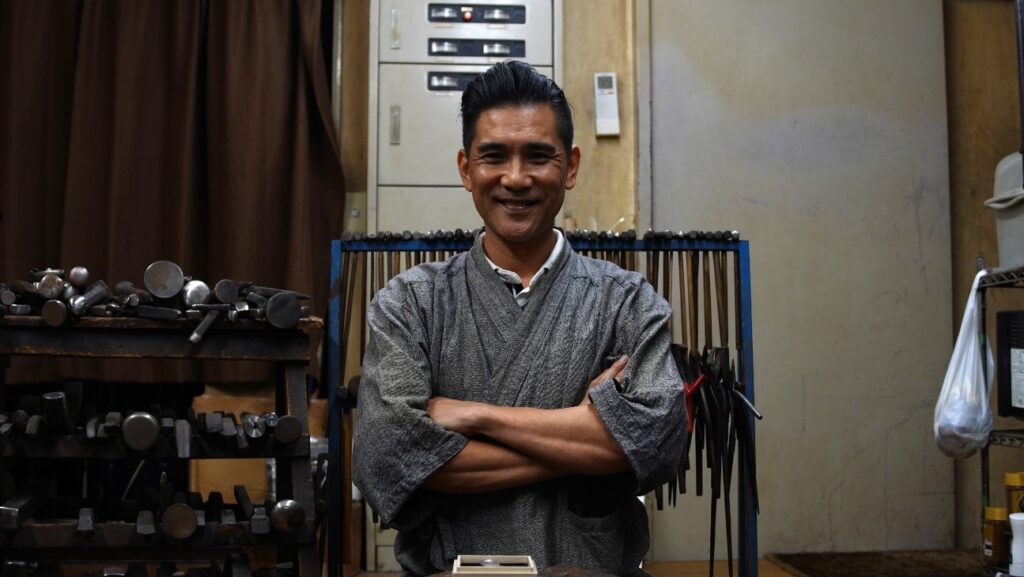
- -Did you think of becoming a craftsman from an early age?
-
I am the eldest of four children, and my first name is Yoshitsugu, which means “successor to the family business. The word “Tsugu” means “successor to the family business,” and I knew from an early age that I was going to take over the family business because of the origin of my name. It is like my fate (laughs).
- -It is interesting that the name has the meaning of “successor to the family business”. I think your father, who is also your godfather, is your mentor, but did he always say that he wanted you to succeed him?
-
No, there were no such words in particular. My parents’ educational policy was that if there was something I wanted to do from childhood, I should take on the challenge, so I wasn’t obsessed with silverware. When I was in school, I was a sporty boy who spent all his time playing volleyball, and I was just a normal student!
- -Weren’t club activities in your time quite tough?
-
No kidding, it was tough. (laughs) We were doing training that would have been unacceptable in 2021. We had to do 10 laps on the ground in typical bunny jumps, and we weren’t allowed to drink water. We were in the middle of the Showa era.
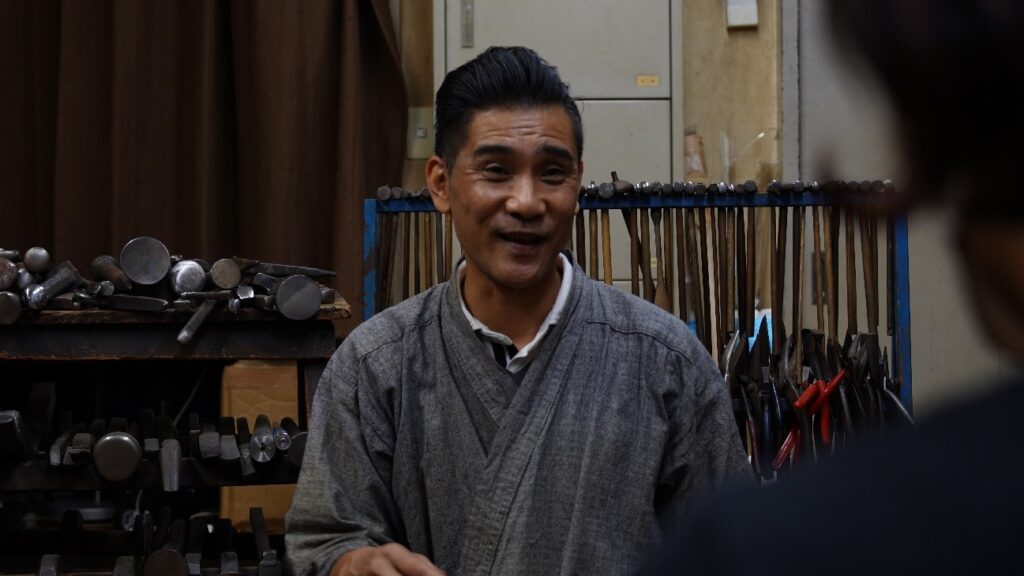
- -When I look at the way you speak and your movements, I get the impression that you are very polite. Is this coming from your experience at the club activity?
-
I think that is one thing, but I also think that my family environment has shaped me the most into the person I am today. At the dinner table, we were not allowed to put our hands on the chopsticks until our father put his hands on them. One day, there was a situation where the whole family was waiting for me at the dining table, and when I was the last one to sit down to eat and was the first to put my hands on my chopsticks, I remember that he overturned the table and said, “What the hell, you! I remember being angry with him. (laughs) My younger brother and sister spent a lot of time watching me do that, and I’m sure they would have looked back at me.
- -Did you go straight into the family business after finishing school?
-
No, I did not enter the family business straight away. I firstly got a job at famous silver company to get some experiences. I had been thinking that I would eventually take over the family business, so after discussing it with my father as part of my social studies, I decided to experience various things outside the company.
- -Did you have any memory during your employment?
-
I felt like I saw the foundation of Japanese manufacturing there. The Factories were operate 24 hours a day, and I was able to learn about the system and roles of manufacturing using a large number of people. I believe that I was able to grow as a human being not only in terms of work but also in my daily life. Since I lived in a dormitory, I was able to do things that are taken for granted, such as turning off lights and cleaning my room.
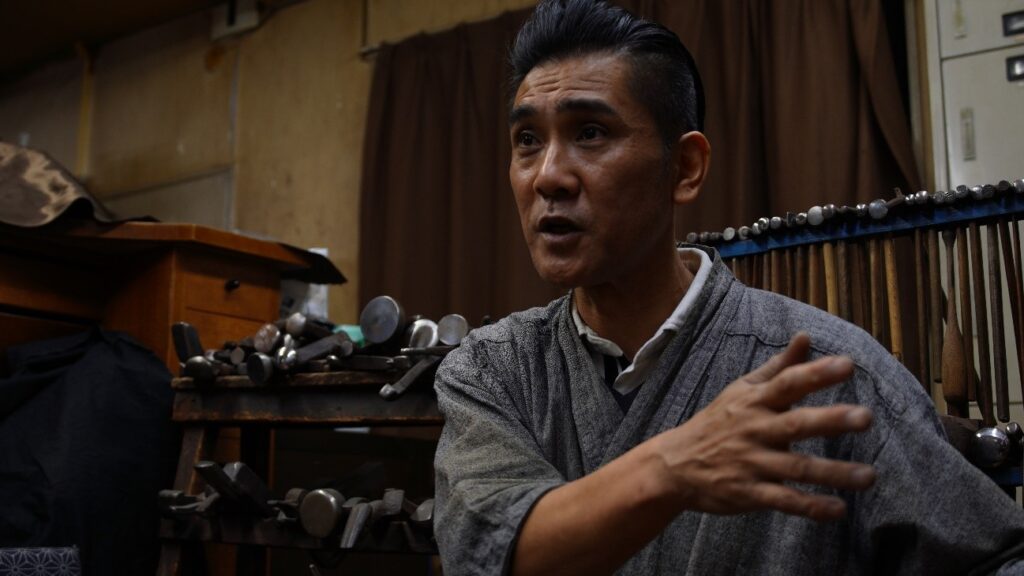
- -How long did you work there?
-
One and a half years. I made the decision to return to the family business when my mother became ill and someone had to take care of her. I was told by the company representative at the time that it would be better and more stable if I stayed and worked here. However, my desire to take over the family business that has been passed down for 12 generations and the feelings behind my name were strong, so I followed my own positive feelings rather than stability. In this short period of one and a half years, I was able to be involved in every field, including general affairs and human resources, in addition to manufacturing operations.From this circumstance, I believe that it was a good experience that I can still use today.
- -I see on your website and SNS that you are putting more effort into sharing your work than into making silverware. How did you decide to focus on sharing your work on social media?
-
The most important point for a craftsman is that the techniques are great and that we have to improve them. However, I felt that this was not the time to passively wait for media to come to me. I thought that if people were interested in this product and who makes it, they would be more interested in the product, so I started a hands-on class and social networking service.

- -That’s right, Mr. Kamikawa, you started the hands-on class, didn’t you?
-
Yes, I started it about 10 years ago to support local tourism and convey the joy of making things. To begin with, it was common for artisans not to talk to customers and not to entertain them. In the industry, we still have the custom of calling wholesalers and retailers as our customers. Moreover, we thought it would be rude to invite customers to our workshop when we would normally take them to our store. However, after thinking about letting people get to know us, we have set up a system to show our workshop by appointment only, and I talk to customers and convey my sincere feelings to them.
- -When did you first realize that it was important to “let people know” about your business?
-
I started it 30 years ago when I returned to the family business and became an apprentice. However, there was no time to do a hands-on class at the same time I became an apprentice, and there were too many things I had to learn before I could become a full-fledged apprentice. You may have seen earlier when you were shooting the video, the “sharpening process” is not so outstanding process, but it is a very important process to smooth the surface. In the past, there was a time when I was told by my master to “sharpen this” and I just kept on sharpening, but at the time I thought, “Why do I have to keep on sharpening? When I think about it now, I feel sorry for the customers at that time. As I gained years of experience and understanding the importance of each process, I realized that if I did not convey this passion to my customers, they would never know about it. Therefore, I try to communicate with customers face to face at events and demonstrations.
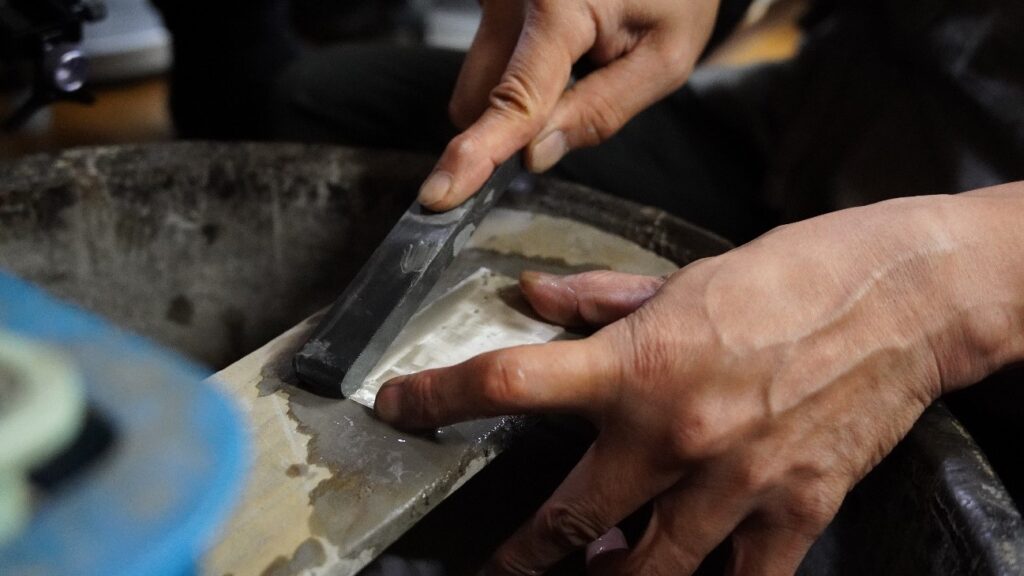
- -I met a craftsman once who told me, “Craftsmen are often called stubborn, but they are not. I believe that is the line of reasoning differs from one craftsman to another”.
Do you have any ideas or words that are important to you as a craftsman? -
I think it is “to continue”. If you don’t have a single line of continuity, this craft will not be preserved. I have a strong sense of feeling that I, not someone else, must continue. I don’t think this is something that can be imposed on me. I hope that through communication and other means, someone other than myself will become interested in the craft and continue it in a new way. I feel that we must create something that will make people feel this way, and I also feel that this is our mission.
- -Finally, do you have a message for the youth?
-
I guess I would say that it is ultimately up to the individual. Any craftsman or writer, whoever your goal is, please go to the workshop. You may not be able to become an apprentice or ask them to teach you, because you may not have the right opportunity at the right time to visit them. If you have the vitality, energy, and enthusiasm to go to that meeting, you may be able to use that willingness for another opportunity while having a different experience. In those years, you can become one or two times bigger as an artist. Also, if you do not change your mind and do not waver in your core, I believe that like-minded people will naturally gather around you. This will make your life richer and more enjoyable, so don’t lie about how you feel and be honest to yourself.
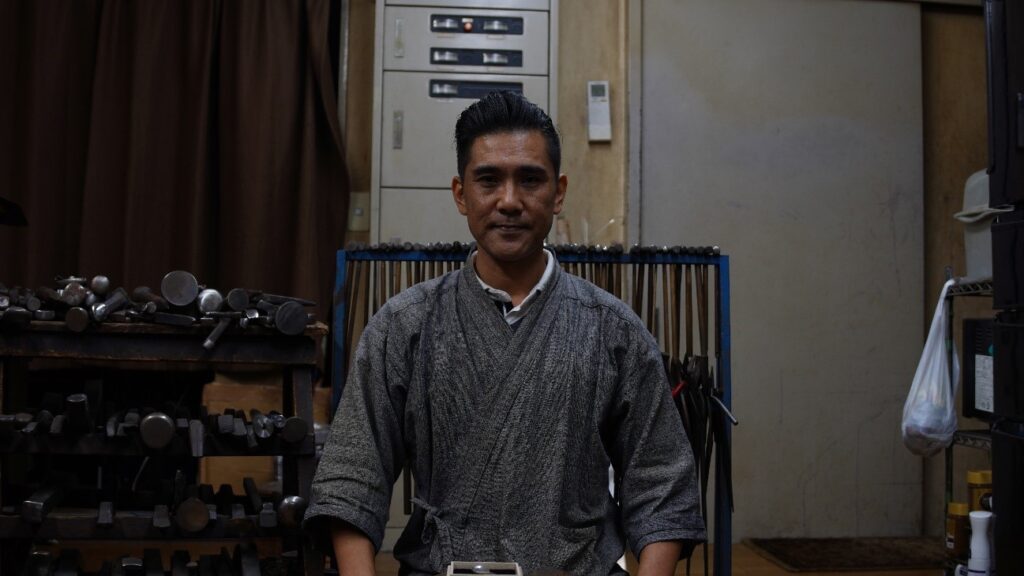
After the interview
After the interview with Mr. Kamikawa, it was a good opportunity for me to think again about the importance of having meaning in each action I take. Considering that one action I take from now on may have an impact on someone somewhere, I felt that I should be cautious, and sometimes I should be bold. Thinking that each decision I make will shape who I will be 10 years from now, I now look forward to the future.
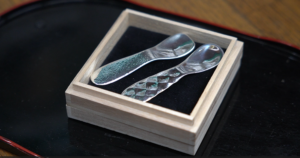
Suigenkyo Online Store
We offer a wide range of products including tableware, accessories, and interior design.
Suigenkyo YouTube
You can see the making process of the products listed on Suigenkyo Online Store.
